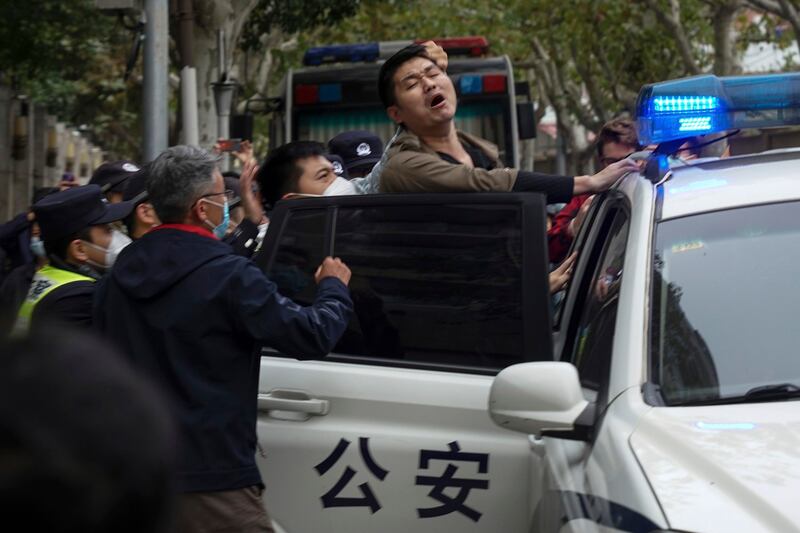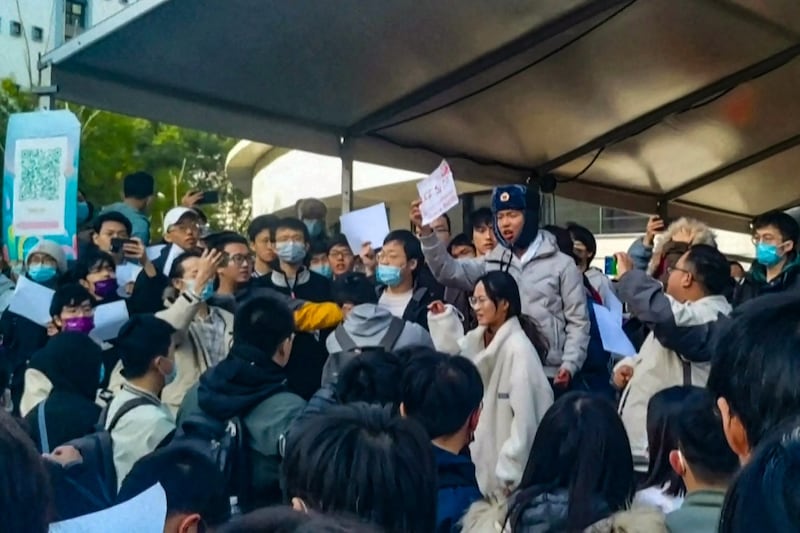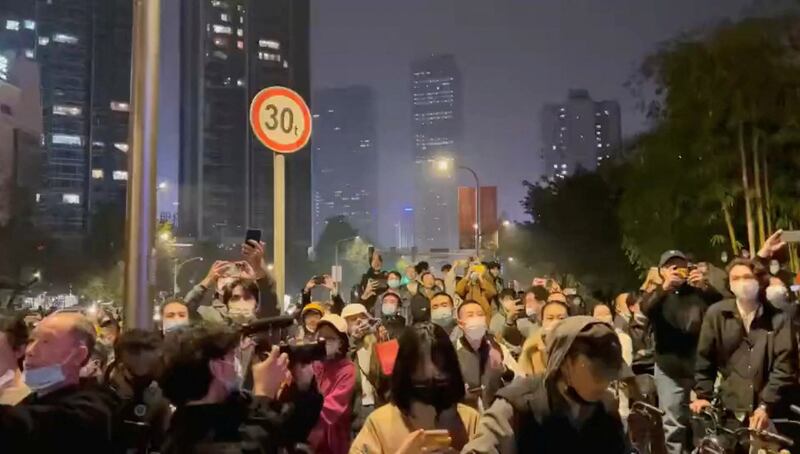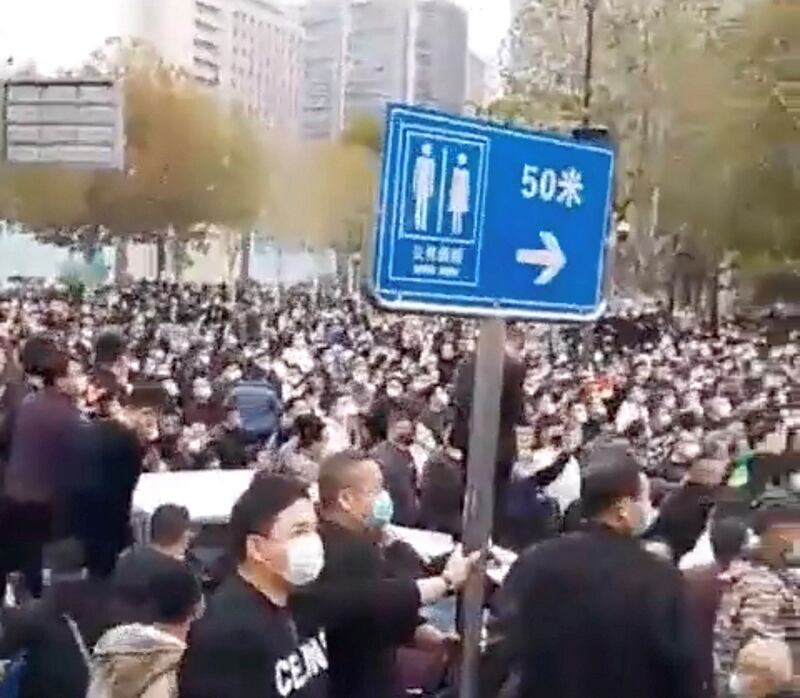A Nov. 24 fire in an apartment block in Xinjiang's regional capital, Urumqi, sparked protests across China over the weekend, with many people expressing condolences for the victims of the lockdown blaze and others hitting back at ruling Chinese Communist Party leader Xi Jinping's zero-COVID policy.
RFA spoke to five people who took part in demonstrations in Beijing, Shanghai, the southwestern city of Chengdu and the southern city of Guangzhou:
Urumqi Road, Shanghai
A protester who gave only the family name Chen for fear of reprisals said he had been at a protest on Shanghai's Urumqi Road near the intersection with Wuyuan Road on Sunday afternoon, which was also a vigil for the Urumqi fire victims.
Chen said he had heard that police had arrested some protesters at the same spot on Saturday, but figured he'd be fine if he stayed further back in the crowd.
"I thought I'd be fine as long as I didn't stand in the front row," Chen told RFA. "I figured that if I stood in the second or third row and they started arresting people, they'd start with the front row."
There were around 500 people already there when Chen arrived at the protest, he said.
"The police would stand there, not moving, most of the time, but then they'd suddenly rush forward, dive into the crowd and drag some people out indiscriminately and put them on a bus," Chen said, adding that the majority of detainees appeared to be women.
"They grabbed me and hung me upside down [from my feet]," he said, still aghast at the memory. "I put my hands on the ground, and there was blood on my hands and blood on my face. I thought, 'that's it, I'm not getting out of this,' and then they put me on the bus."
Chen said he witnessed the beating of a woman who tried to resist being taken to the bus.
"Around a dozen police officers pinned this woman to the ground and beat her up, with the woman struggling desperately the whole time," he said. "Then they hung the woman upside down [like they did with me] and more than a dozen of them got her onto the bus."
Chen, who is extremely near-sighted, said he was able to jump off the bus while police were dealing with other detainees, but lost his shoes and his glasses in the process.
He walked in his socks to hide in a nearby street, with the help of several passers-by, before eventually going home, he said.
Chen says he still feels fearful as a result of the incident.
"I told [a friend] that I would check in with her every day so she knows I'm okay, and that she's to tweet my personal details if she doesn't hear from me one day," he said.
All the protesters interviewed by reporters shared similar fears, and all chose not to use their real voices on the radio.

Tsinghua University, Beijing
Mr. X from Tsinghua University first caught sight of the protest on the college campus when he was heading to the student cafe in the Bauhinia Garden building. He declined to give a name to ensure his personal safety.
Video shot by Mr. X and sent to RFA showed around 20 people standing around holding up blank sheets of paper, in protest at curbs on their freedom of speech.
The protesters sang the Chinese national anthem, and shouted slogans calling for "democracy and the rule of law, freedom of expression," their voices echoing at the front of the building, the footage shows.
According to Mr. X, the university sent a number of teachers to mediate with the students.
"The teachers promised to modify the requirements for daily COVID-19 testing, rethink which areas were under lockdown and review the rules for entering and leaving the school campus, hold a meeting with school leaders [on Monday], and that nobody would be held accountable [for taking part in the demonstration]," he said.
But pretty soon after that, Communist Party workers started doing "ideological work" with students, jumping into discussions on WeChat groups to warn people not to be "deceived by foreign forces and traitors [to China]."
The Bauhinia Garden rally dispersed at around 2:00 p.m. on Sunday, but then students were called to emergency political meetings across the school at 8:00 p.m., at which they were told not to take part in any more protests.

Wangping Street, Chengdu
An anonymous protester from the southwestern city of Chengdu, capital of Sichuan province, said he hadn't seen such a level of anti-government feeling expressed in public since the student-led pro-democracy movement of 1989.
"There has been such a sense of mourning around the country, as well as dissatisfaction," the protester, who asked to be named only as Mr. J to protect himself and his family, told RFA. "This is an emotion that hasn't been seen publicly in China since [1989]."
The man said he saw a WeChat message in a group chat calling on people to go to a candlelight vigil for the victims of the Urumqi fire in Wangping Street, beside the Jin River.
Video footage of the vigil shot by Mr. J shows a young woman standing in the front line of protesters, who are facing off with a row of police officers.
"Do you know how many businesses are standing empty here [near] Chunxi Road, Ping Street?" she says to the cops. "Longquan district is still under lockdown, and so is Qingbaijiang district."
"You're all fine because you have your salaries, but did you know that ordinary people are supporting you with their savings?" the woman says, to be met with a nonplussed silence.
"The police were very low-key, and just kept telling her not to get emotional, and to pay attention to her safety," Mr. J said.
The vigil began with a group of people sitting in a circle with candles to express their condolences for the victims of the fire, but as the crowd grew, people started shouting slogans, including: "Votes, not emperors!" and "Freedom! Freedom!"
Mr. J estimated that some 2,000 people eventually gathered at the scene, with some dragged away by police.

Haizhu Square, Guangzhou
A Guangzhou resident who gave only the family name Wan said he turned up at Haizhu Square in the southern city of Guangzhou at around 10:30 p.m. on Saturday evening, to find some 20 to 30 people holding signs, surrounded by phalanxes of police officers.
A number of protesters outside the police shield wall chanted slogans calling on police to release the "kettled" protesters, which police eventually did after surrounding them for more than an hour, Wan told RFA.
Photos of the scene taken by Wan and sent to RFA showed a crowd of thousands of people -- although it was unclear how many were protesting and how many simply standing and watching -- with many holding up a blank sheet of paper.

Zhongshan Avenue, Wuhan
A small business owner from the central city of Wuhan, who gave only the nickname "Howard" for fear of reprisals, shot video footage of a demonstration on the intersection between Zhongshan Avenue and Duofu Road in the city, with large numbers of police in rows, separating one group of people from another in a process known as "kettling."
"Residents were chanting slogans demanding an end to the lockdown, and for the city leaders to come forward [to talk to the crowd]," Howard told RFA. "Someone shouted 'we're not in the Qing Dynasty any more,'" he said, in a reference to China's last imperial dynasty, which ended with the 1911 revolution of Sun Yat-sen.
He said the protest was in a part of town densely populated with small businesses.
Many business owners removed lockdown fences and traffic barriers on Sunday, and police made no move to stop them, he told RFA.
Translated and edited by Luisetta Mudie.
